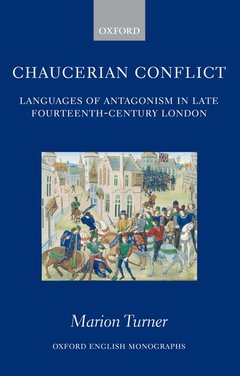Description
Chaucerian Conflict
Languages of Antagonism in Late Fourteenth-Century London
Oxford English Monographs Series
Author: Turner Marion
Language: English
Publication date: 11-2006
224 p. · 14.4x22.3 cm · Paperback
224 p. · 14.4x22.3 cm · Paperback
Description
/li>Contents
/li>Biography
/li>Comment
/li>
Chaucerian Conflict explores the textual environment of London in the 1380s and 1390s, revealing a language of betrayal, surveillance, slander, treason, rebellion, flawed idealism, and corrupted compaignyes. Taking a strongly interdisciplinary approach, it examines how discourses about social antagonism work across different kinds of texts written at this time, including Chaucer's House of Fame, Troilus and Criseyde, and Canterbury Tales, and other literary texts such as St Erkenwald, Gower's Vox clamantis, Usk's Testament of Love, and Maidstone's Concordia. Many non-literary texts are also discussed, including the Mercers' Petition, Usk's Appeal, the guild returns, judicial letters, de Mezieres's Letter to Richard II, and chronicle accounts. These were tumultuous decades in London: some of the conflicts and problems discussed include the Peasants' Revolt, the mayoral rivalries of the 1380s, the Merciless Parliament, slander legislation, and contemporary suspicion of urban associations. While contemporary texts try to hold out hope for the future, or imagine an earlier Golden Age, Chaucer's texts foreground social conflict and antagonism. Though most critics have promoted an idea of Chaucer's texts as essentially socially optimistic and congenial, Marion Turner argues that Chaucer presents a vision of a society that is inevitably divided and destructive.
Introduction: Chaucerian Conflict. 1. Discursive Turbulence: Slander, the ligHouse of Famel/ig, and the ligMercers' Petitionl/ig. 2. Urban Treason: ligTroilus and Criseydel/ig and the Treasonous Aldermen of 1382. 3. Idealism and Antagonism: Troynovant in the Late Fourteenth Century. 4. Ricardian Communities: Thomas Usk's Social Fantasies. 5. Conflicted Compaignyes: The Canterbury Fellowship and Urban Associational Form. 6. Conflict Resolved?: The Language of Peace and Chaucer's 'Tale of Melibee'. Conclusion.
Marion Turner gained her doctorate from Oxford in 2002. She was then a Fellow of Magdalen College, Oxford, and is now a Lecturer in Medieval Literatures at King's College London. She has published several articles on Chaucer and his contemporaries, and has also appeared several times on television and radio discussing medieval literature and history.
It is refreshing to read a work of literary criticism so enmeshed in primary sources and so able to construct its own understanding of a historical moment. Turner is a sensitive reader of texts, and her vision of Ricardian intertextuality is mapped out with precision and care... [Her conclusion] is one with which all Chaucerians must now grapple
© 2024 LAVOISIER S.A.S.




